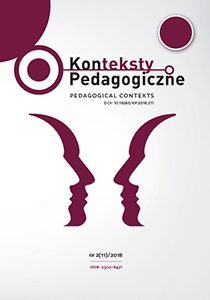Abstract
In the modern schooling system, at the first stage of education pre-paration for challenges of the future should perform the key role. In the face of civilization changes, education faces many new demands it must cope with. However, implementation of this project raises some dilemmas verified by reality. Therefore, parents should be engaged in the process of education in the media.
References
Adamski, F. (2010). Znaczenie wychowania w rodzinie. In: F. Adamski (ed.), Wycho-wanie w rodzinie (p. 7–15). Kraków: Wydawnictwo Petrus.
Anderson, J. & Wilkins, R. (2000). Żegnaj telewizorku. Jak nauczyć swoją rodzinę roz-sądnie korzystać z telewizora, gier komputerowych i Internetu, trans. M. Czekański. Warszawa: Wydawnictwo Adamantan.
Bromboszcz, E. (1993). Percepcja reklamy telewizyjnej przez dzieci. Psychologia Wy-chowawcza, 1, 32–41.
Dobrołowicz, J. (2011). Zagrożenia socjalizacji w rodzinie w warunkach dominacji kultury popularnej. In: J. Jęczeń & M. Stepulak (eds.), Wartość i dobro rodziny(p. 285–293). Lublin: Wydawnictwo KUL.
Dryden, G. & Vos, J. (2000). Rewolucja w uczeniu, trans. B. Jóźwiak. Poznań: Zysk i S-ka.
Doliński, D. (1998). Psychologia reklamy. Wrocław: Agencja Reklamowa “Aida”.
Kiełb-Grabarczyk, D. (2013). Wychowanie pod presją, czyli dzieciństwo XXI wieku. Wychowanie w Rodzinie, 2, 317–329.
Kłosińska, T. (2003). Dziecko wobec mediów. In: W. Korzeniowska & U. Szuścik (eds.), Rodzina. Historia i współczesność. Studium monograficzne (p. 291–304). Kraków: Im-puls.
Kossowski, P. (1997). Reklama i dziecko. Pedagogiczny wymiar zjawiska. Problemy Opiekuńczo-Wychowawcze, 8, 9–12.
Strykowski, W. & Skrzydlewski, W. (eds.). (2002). Media i edukacja w dobie integracji. Poznań: Wydawnictwo eMPI2.
Pielachowski, J. (2002). Przemoc na ekranach i przemoc prawdziwa. In: W. Strykowski & W. Skrzydlewski (eds.), Media i edukacja w dobie integracji (p. 267–280). Poznań: Wydawnictwo eMPi2.
Raport Komercjalizacja dzieciństwa, www.gbritain.net/news/ [accessed: 29.05.2009].
Reczek-Zymróz, Ł. (2018). Wychowanie jako platforma współpracy nauczycieli szkoły podstawowej i rodziców na podstawie badań porównawczych przeprowadzonych w Polsce i na Węgrzech. Konteksty Pedagogiczne, 1(10), 109–110.
Toffler, A. (1974). Szok przyszłości, trans. W. Wiktor Osiatyński, E. Grabczak-Ryszka & E. Woydyłło. Warszawa: PIW.
Jęczeń, J. & Stepulak, M. (eds.). (2011). Wartość i dobro rodziny. Lublin: Wydawnictwo KUL.
Wharton, W. (2000). Tam, gdzie spotykają się wszystkie światy. Powrót do krainy dzieciń-stwa, trans. Z. Batko. Poznań: Rebis.
Zwiernik, J. (2005). Globalny dzieciak. In: J. Bińczycka & B. Smolińska-Theiss (eds.), Wymiary dzieciństwa. Problemy dziecka i dzieciństwa w zmieniającym się społeczeństwie (p. 181–188). Kraków: Impuls.
In accordance with the recommendation of the Ministry of Science and Higher Education, which aims to counteract the practice of “ghostwriting” and “guest authorship,” all authors submitting their text for publication should attach an author’s statement which declares the contribution of each of the authors to the article. The printed and signed statement should be delivered by mail or other means to editor-in-chief Joanna Skibska or sent in the form of a scan to the following e-mail address: redakcja@kontekstypedagogczne.pl. The authors will not receive remuneration for publishing their papers. The editors reserve the right to make minor editorial changes to the articles which will not affect the substance of the article. We encourage all authors to prepare their articles in accordance with the guidelines for manuscript preparation. Download pdf file.
Authors transfer all copyrights and grant the journal the right of first publication with the work simultaneously licensed under a Creative Commons Attribution License that allows others to share the work with acknowledgement of the work's authorship and initial publication in this journal. All authors agree to the publishing of their email addresses, affiliations and short bio statements with their articles during the submission process.

